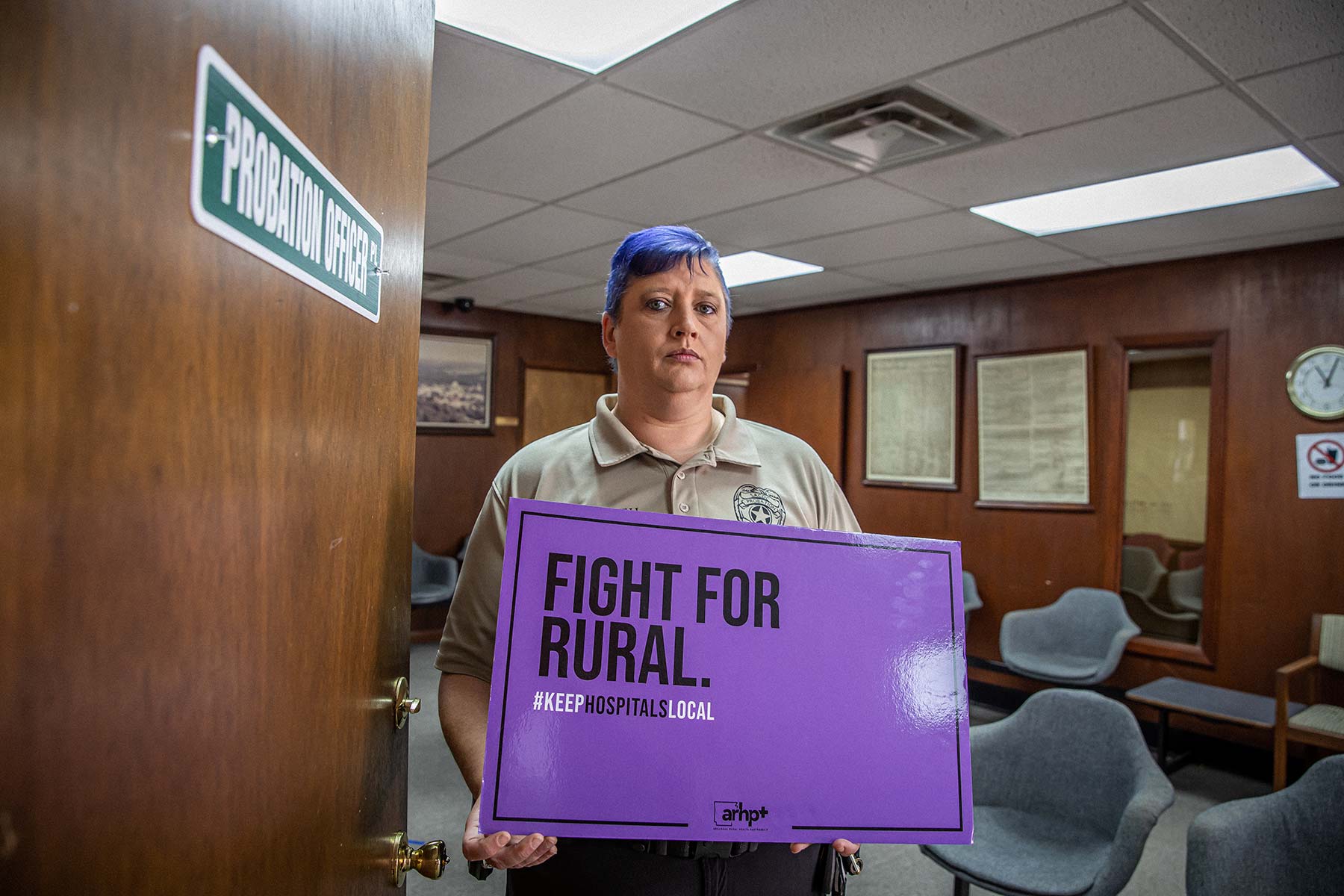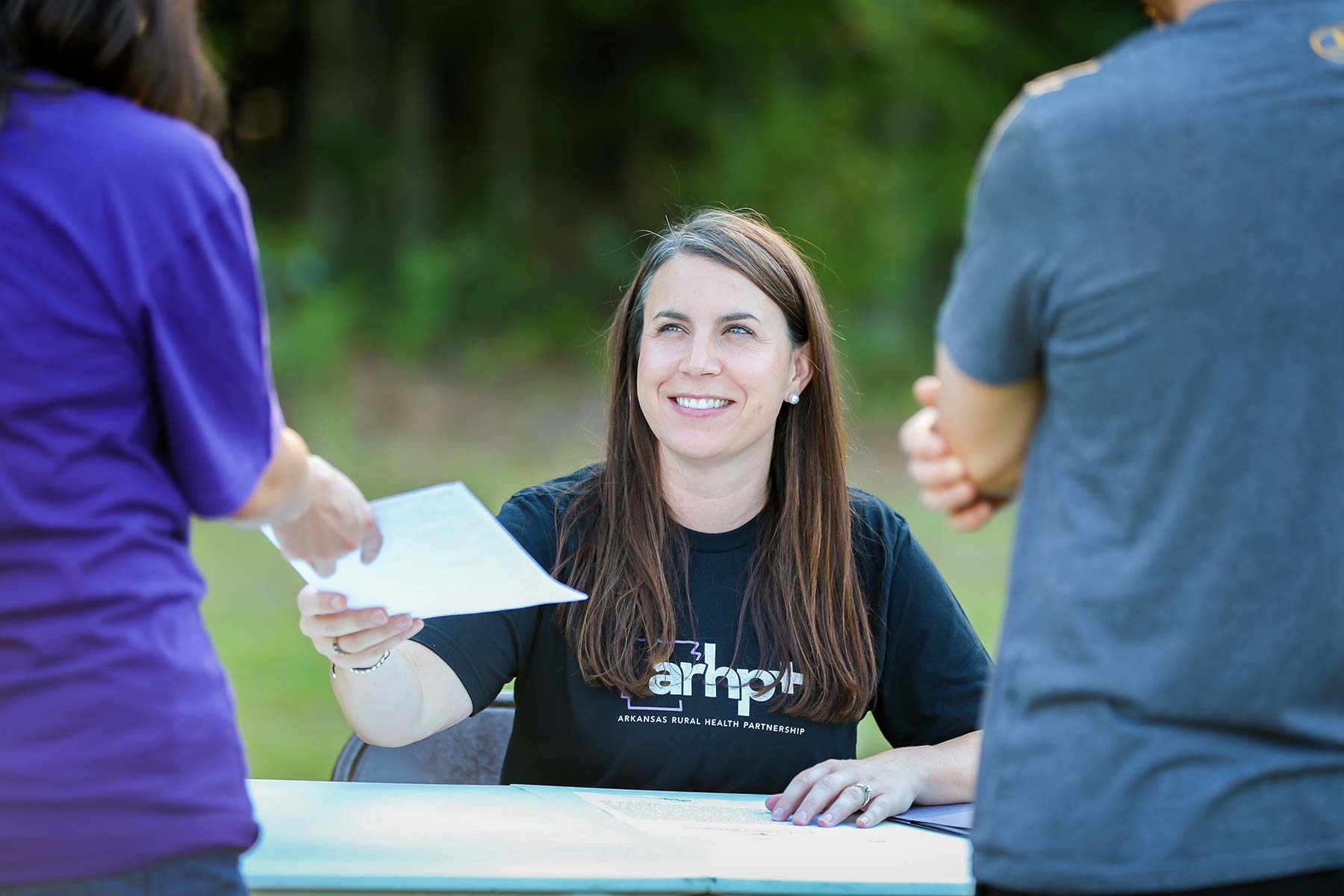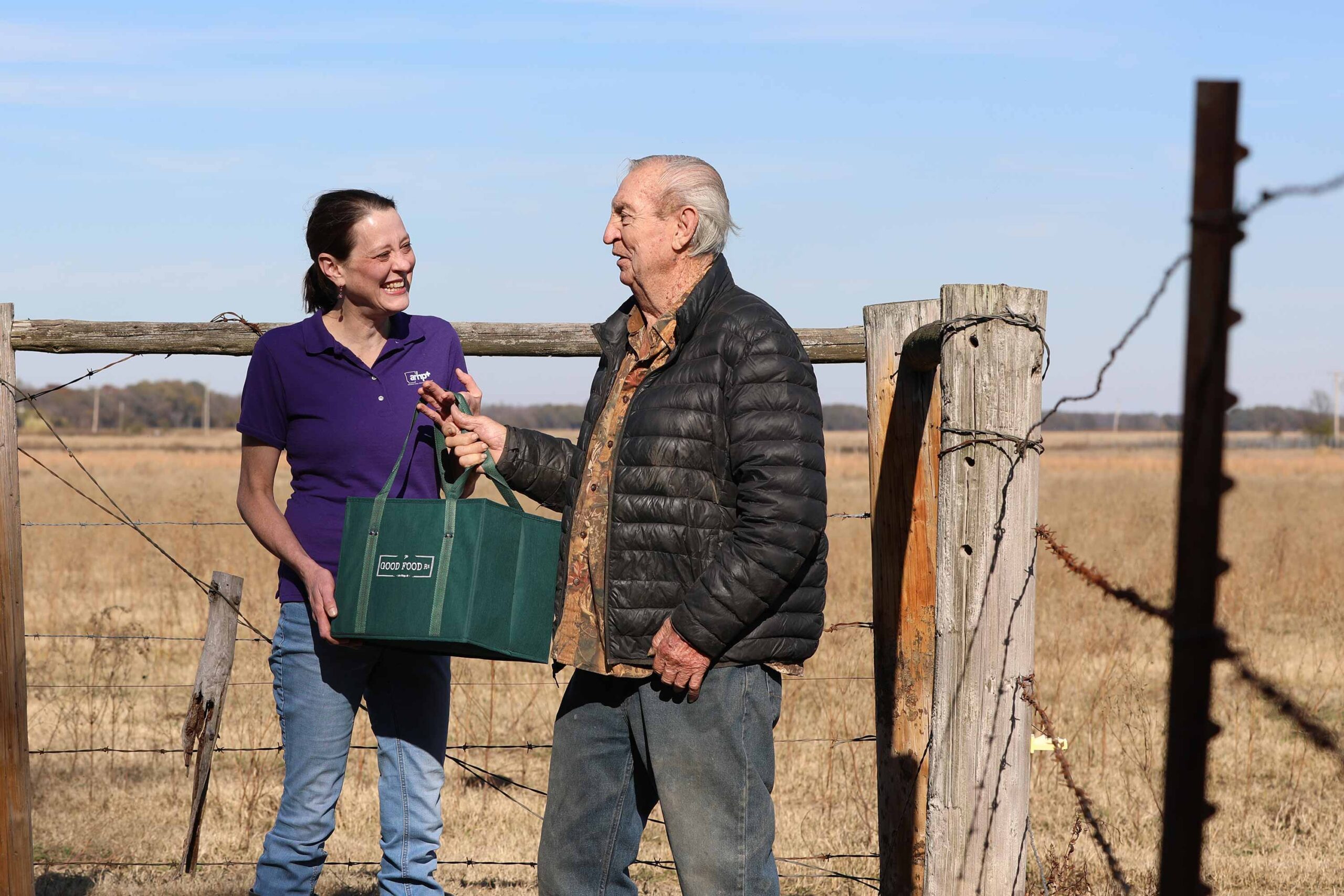Initiatives
We cover rural health from A to Z.
To enable full functionality of this PDF, please save the file to your computer and use Adobe Reader®, available at www.adobe.com/reader/.

The Arkansas Rural Health Academy
The newly accredited state training center in Pine Bluff, AR, brings a diverse array of certificate and degree-path training programs in frontline health careers, nationally recognized certifications, and continuing education courses to support health professions throughout the state. Current programs include certifications for Patient Care Technicians, Medical Assistants, EMTs, Paramedics, and Community Health Workers, and healthcare provider certification and training (Basic Life Support, CPR, First Aid, ACLS, PALS, NALS, etc.)

Arkansas Rural Health Workforce Network
The new statewide network will coordinate, develop, and strategically design regional and state-level strategic plans to advance rural health workforce initiatives across the state. The project also includes the development of a rural health workforce toolkit, which will be available in December 2025.

Community Health Needs Assessments
(Members Only) The IRS requires member healthcare organizations to complete a detailed needs assessment that engages community members, key stakeholders, and leaders every three years. ARHP facilitates this process and develops the final plan in coordination with member organizations. Hospital CHNAs are located on their websites.

Connect to Emergency Response
Eligible students receive targeted support (i.e., tuition assistance, college & career counseling, supplies, etc.) to enroll in and complete certificate and/or degree-path programs in Emergency Medical Training (EMT), Paramedic & Community Paramedic.

Connect to Healthcare Operations
Eligible students receive targeted support (i.e., tuition assistance, college & career counseling, supplies, etc.) to enroll in and complete certificate and/or degree programs in Healthcare Operations. Programs of study include medical coding and billing, health information management, clinical documentation, and healthcare administration.

Executive Coaching
(For Members Only)Targeted training is offered to members through Zoom webinars. Recent training includes a 4-part series on grant development. Rural hospital, clinic, and health center administrators often wear numerous hats and suffer from staffing gaps. ARHP offers coaching for individuals in new or existing rural health leadership positions, helping to ensure a long and rewarding career.

ARHP Healthcare Resource Directory
The comprehensive directory provides a detailed list of health and health-social resources available throughout the 26-county ARHP service area. Rural residents, healthcare staff, and social service providers benefit from this easy-to-read directory of locally available health & health-social services and resources, organized by county. The 100+ page catalog is updated each July and is available online and in print format.

Health Careers Website
The interactive, engaging site provides an in-depth introduction to over 40 in-demand health careers throughout rural Arkansas. Each health career highlight includes a corresponding video interview with a local health professional, education & training requirements, local programs of study, and the anticipated annual salary.

Health Workforce Mobile Unit
Rural students and educators benefit from a mobile learning experience that increases exposure to health career opportunities in rural Arkansas. The mobile unit features simulation experiences (including an Anamatoge table), interactive whiteboards to navigate the health careers website, student and career success coaches, and visiting health career hosts. Managed by ARHP and in partnership with UAMS and CHCA.

Hospital Board Retreats
(For Members Only) Targeted training is offered to members through Zoom webinars. Recent training includes a 4-part series on grant development. Rural hospital boards play a vital role in the organization’s viability and sustainability. ARHP facilitates board retreats to increase understanding and engagement, improve service delivery, and better support hospital leadership.

Living Free – Mental Wellness
Over 1 in 4 rural Arkansas residents experience poor mental health. Current efforts work to increase utilization of evidence-based behavioral health screening tools in the primary care setting, engagement in early intervention services, access to needed resources, and training rural residents of all ages and backgrounds to recognize the signs and symptoms of mental health & substance use concerns to mobilize a new generation of rural residents that live free, with needed mental health supports.

Living Free – Substance Use
Peer recovery specialists provide targeted support to individuals with substance use disorder through prevention, treatment, and recovery, while coordinating closely with local health systems, law enforcement, and court systems. Staff also provide Narcan training to community members, schools, first responders, and healthcare workers throughout the region. (Narcan is a medication known to reverse opioid overdose rapidly.)

Member Job Board
(Members Only) The online job board features current employment opportunities at member hospitals, health centers, and affiliated clinics (100+ locations).

Mental Health First Aid (MHFA) Training
The evidence-based training model teaches individuals how to identify, understand, and respond to signs of mental health & substance use concerns. Instructors offer training to various audiences (i.e., youth, college students, healthcare workers, emergency responders, and community members) throughout Arkansas.

Opioid Crisis Informational Video
The educational video raises awareness about the opioid crisis among local residents and health and social service providers.

Patient Navigation and Enrollment Services
Community Health Workers (CHWs) provide patient assistance, navigation, and connection to needed resources, including but not limited to prescription, housing, utility, and food assistance, as well as insurance enrollment (Medicare, AR Works & public insurance options). Services are available via a 24/7 toll-free number and in-person at designated ARHP offices & member sites.

Professional Roundtables
(Members and Sponsors Only) Department-oriented meetings offer peer support for members spanning nearly 20 focus areas (i.e., nursing, human resources, finance, etc.). Roundtables facilitate peer learning & support, while improving communication, efficiency, cost savings & revenue.

Question, Persuade, and Refer (QPR) Training
The evidence-based training model teaches individuals how to recognize and respond to suicide risk while providing time-sensitive interventions.

The Rural Health Launch Pad
The new initiative will engage individuals in two frontline healthcare training programs (medical assistant & patient care technician) at the Arkansas Rural Health Academy and local academic institutions. Individuals will be cross-trained in Mental Health First Aid (MHFA) and as Community Health Workers (CHW), which will make them attractive to employers and well prepared to respond to the complex health and health-social needs of patients throughout the service area.

Rural Health Workforce Development Platform
The new initiative will develop a comprehensive and interactive rural health workforce toolkit to engage and support key rural stakeholders and community members in effectively developing strategic plans that shape rural health workforce efforts. Regional and state-wide strategic plans will also be developed during the one-year initiative.

Senior Health
Seniors (60 years and above) receive targeted support to reduce common barriers to health & wellness. Efforts aim to improve the overall health needs of seniors with diabetes and/or cardiovascular disease through social determinants of health interventions, new and expanded nutrition and exercise programs, and remote monitoring to enhance health outcomes.

SNAP for Seniors
The new initiative utilizes community health workers to assist eligible seniors in enrolling in SNAP benefits (food assistance).

South Arkansas Behavioral Health Task Force
Individuals representing a range of sectors (e.g., primary care, behavioral health, social services, law enforcement, workforce) convene quarterly to network, share resources, and collaborate on the design and implementation of new and expanded behavioral health infrastructure across the region and state.

Strategy, Development & Communications
(Members Only) Rural health organizations often lack professionals specializing in marketing, graphic design, grant writing, and fundraising, who are hard to recruit and expensive to retain. Members benefit from access to design and development professionals to support their communications and fundraising efforts.

The Good Food Rx
Seniors (65+) with chronic diseases experiencing food insecurity benefit from personalized food delivery, nutritional and health coaching, healthy recipes and cooking classes, virtual patient education, and remote patient monitoring with outcomes tracking and support.

Virtual Staffing for Rural Health Organizations
(For Members Only) Targeted training is offered to members through Zoom webinars. Recent training includes a 4-part series on grant development. Rural health organizations often struggle to recruit and retain highly specialized professionals to support critical operations. ARHP provides virtual project managers, C-suite professionals, and more to meet identified member needs.

Youth Mental Health Corps
Targeted training is offered to members through Zoom webinars. Recent training includes a 4-part series on grant development.

Zoom Training
( For Members Only) Targeted training is offered to members through Zoom webinars. Recent training includes a 4-part series on grant development.

Rural Arkansas Community Health Worker Training Institute
The Arkansas Community Health Worker Association recognizes the institute as an approved Community Health Worker (CHW) training site for the state of Arkansas. Students, community members, and key stakeholders are trained as community health workers to meet the demonstrated health and health-social needs of rural residents.